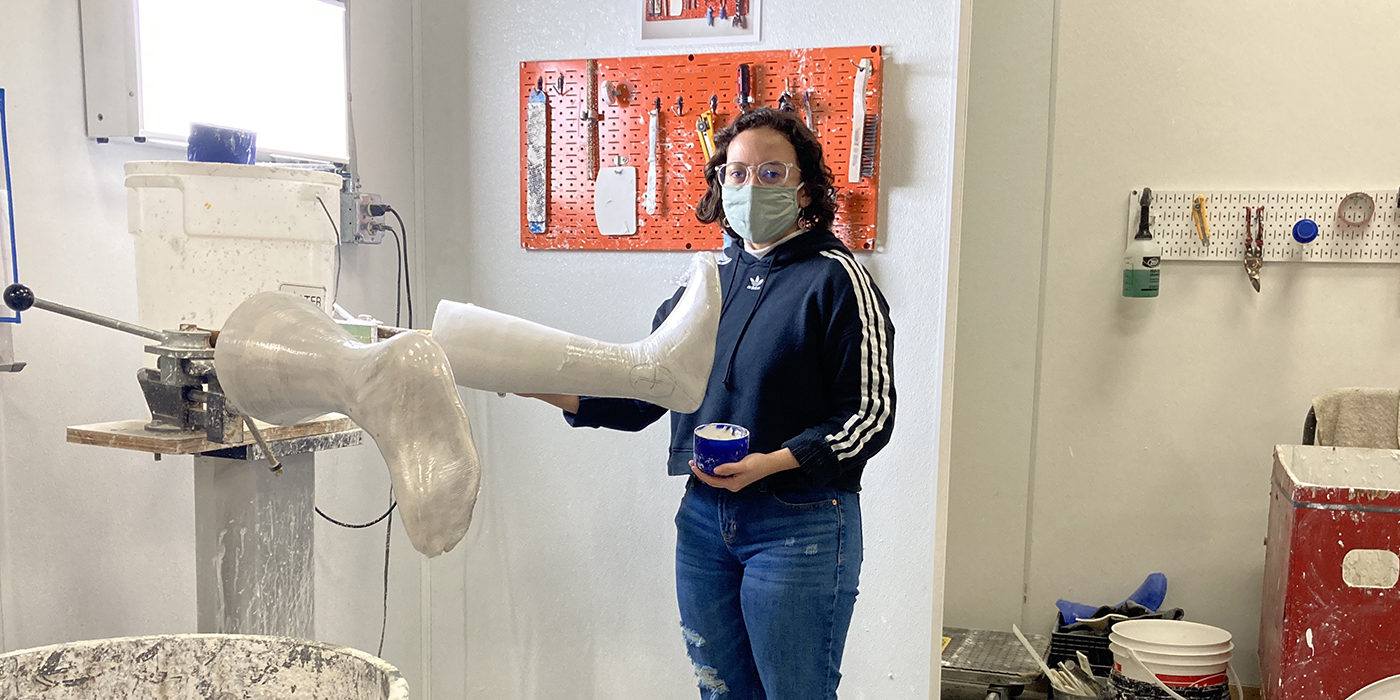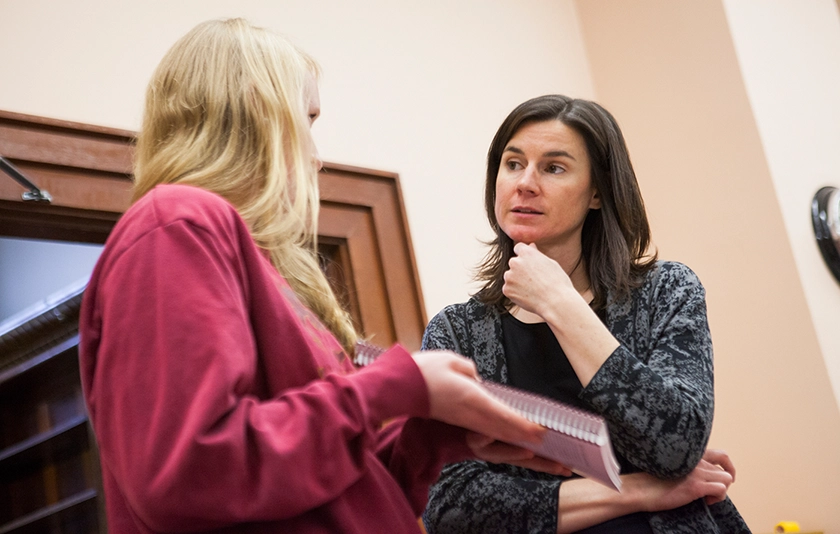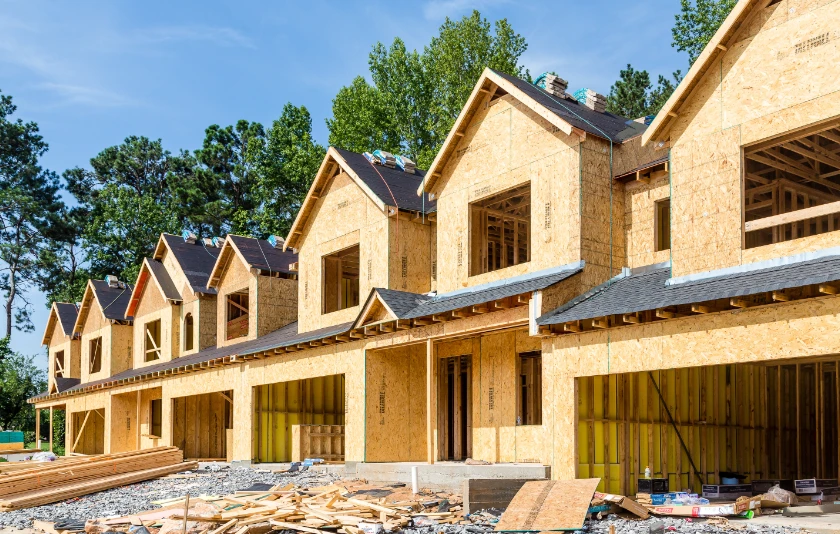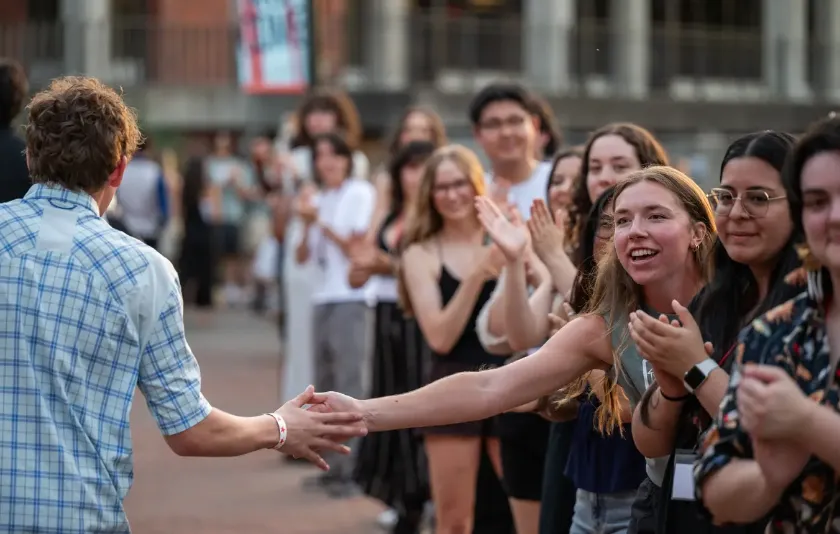A deep commitment to community and a hands-on approach shaped Noelle Medina’s (pronouns: they/them) undergraduate years at Willamette University — and promises to do the same for their future.
An interest in creative problem-solving, helping others and making connections first drove Medina ’21 toward an exercise and health science major. The same skills helped the Latinx senior advance opportunities on campus, from guaranteeing gender-neutral restrooms in every campus building to leading student involvement projects.
These experiences and the program itself sharpened their leadership abilities as they progress toward their ultimate goal — to start a prosthetics company.
Prioritizing campus involvement
Medina’s interest in prosthetics grew out of high school engineering classes in California, and they sought Willamette’s exercise and health science program for its advanced training and experience compared to other programs.
Classes in biomechanics, physiology and physiology of exercise were particularly useful for understanding research. Medina became acquainted with several devices — an EMG, force platforms — that are also used in professional studies, which allowed them to be more critical of research methods, they said.
Professors played a particularly meaningful role in their education. Professor of Exercise and Health Science Stasinos Stavrianeas pushed students to be better critical thinkers, while Associate Professor of Exercise and Health Science Brandi Row Lazzarini was extremely accessible, both in terms of being easy to approach and Lazzarini’s habit of recording classes (even before the pandemic) that made it easier to refer back to material, they said.
“For someone like me, who had undiagnosed ADHD, it was really hard to refocus if I missed something,” Medina said. “But in her class, I could go back and make sure I learned everything. She’s very explicit in her expectations, too — the way she taught left us with a very solid understanding of where we were going with the material.”
The education Medina found outside the classroom was equally important and widespread.
Leadership training through a service and sustainability track in Jump Start, Willamette’s pre-orientation program, prompted Medina to later take on a service-learning coordinator position and become a Take a Break leader. They also became a member of emergency medical provider Willamette’s Emergency Medical Services (WEMS), a summer residential and teaching assistant at college prep program Willamette Academy, a peer tutor for biomechanics and a member of the badminton club.
Medina connected to others through campus employment, too. At the Office of Student Involvement, Medina was an office assistant who worked with other student leaders, helped run big events like Family Weekend and managed the Office of Student Activities website before advancing to a bigger role training new employees and directing the office’s various projects. At The Bistro, Medina gained tactile and financial skills at the social center of campus, first as a barista then as financial manager. They most valued figuring out how to run a business during the pandemic, a fraught and unpredictable time that provided invaluable lessons on leading during a crisis, they said.
Volunteering off campus gave Medina insight on the greater community. They participated in several Service Saturdays, packaging donations at Marion-Polk Food Share and landscaping at Bush Pasture Park, through the Office of Community Service-Learning.
“I recognized I was coming into a community and very much benefiting from it, but they didn’t really benefit from me being here,” they said. “So I wanted to learn more about Salem and the different issues it was facing, and find ways to give back.”
Striving for equity
Inclusivity is at the heart of many of Medina’s accomplishments.
They worked with Andrea Doyle Hugmeyer, director of the Gender Resource and Advocacy Center, and Jade Aguilar, the former vice president of equity, diversity and inclusion, to ensure gender-neutral restrooms existed on every floor of every building on campus. Medina also co-facilitated the Queer, Trans, Students of Color Club, joined the university Trans* Advocacy Committee and provided mentorship to younger students as a way to pay it forward, they said.
For their senior seminar project, Medina wanted to learn more about website accessibility — adding descriptions to photos, for instance, to ensure people who are visually impaired can still understand what’s represented on the page. After a two-year internship with Shannon Levin ’08, who owns Mobility Solutions Prosthetics & Orthotics in Salem, Medina offered to examine Levin’s website and make suggestions. Healthcare websites especially need to be accessible to everyone, Medina said.
In recent months, Medina has been salvaging, repairing and beautifying old bicycles — a combination of their passion for mechanics and aesthetics — and revived the campus Bike Shop, which is currently being run from Montag Den. The idea inspired them after a recent trip to Chicago, when Medina and their partner fixed up old bikes instead of taking public transportation. Building a bike is technically similar to creating prosthetics, and they wanted to keep up on their mechanical skills, they said.
The work won’t continue for much longer. In June, Medina will move to Connecticut to start their M.A. in prosthetics and orthotics at the University of Hartford, a program they solely chose for the community involvement opportunities and the chance to work with young people who experience mobility struggles. A two-year residency will follow.
“I’m happy with everything I’ve done and everything I’ve learned from Willamette,” they said. “I’m excited to take these next steps.”




